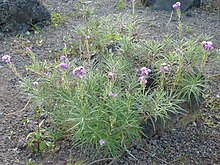Erysimum caboverdeanum
| Erysimum caboverdeanum | |
|---|---|
 |
|
| Erysimum caboverdeanum at the Botanical Garden in Las Palmas de Gran Canaria | |
| Scientific classification | |
| Kingdom: | Plantae |
| (unranked): | Angiosperms |
| (unranked): | Eudicots |
| (unranked): | Core eudicots |
| Order: | Brassicales |
| Family: | Brassicaceae |
| Genus: | Erysimum |
| Species: | E. caboverdeanum |
| Binomial name | |
|
Erysium caboverdeanum (A.Chev) Sunding, 1974 |
|
Erysimum caboverdeanum is a species of flowers that belong to the Brassicaceae family. The species are endemic in Cape Verde and is an endangered species. The species was discovered by the Auguste Chevalier in 1935 as Matthiola caboverdeana, it was changed to its current name by Per Øgle Sunding in 1974.
Its local name is cravo-brabo (wild carnation) or white rosemary (alecrim-branco), in English, it is also called Cape Verdean wallflower.
The last part of the name caboverdeanum means the name "Cape Verdean" where the plant is founded.
It is used as a traditional medicine notably for treating a form of infusion
The plant is biennial, Its length is 60 centimeters, its stems are woody and stands upright, the narrow leaves are 6 cm long and 2 millimeters wide.
Erysimum caboverdeanum are founded only in the island of Fogo on Monte Velha as well as Pico do Fogo and Bordeira between 1,600 and 2,300 meters. It grows mainly on volcanic soils.
Some of the plants in Chã das Caldeiras, mainly inside and around the village were killed by lava during the eruption of Fogo in late 2014.
A plant is founded on the left of the backyard of the São Filipe Municipal Museum. Another is at Jardín Botánico Canario Viera y Clavijo in Las Palmas de Gran Canaria
...
Wikipedia
